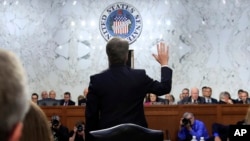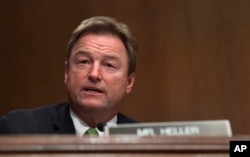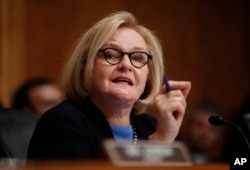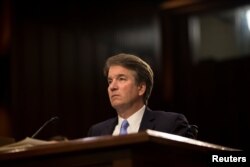Dogged by a sexual assault accusation, U.S. Supreme Court nominee Brett Kavanaugh presents a political minefield for vulnerable Republican and Democratic senators seeking re-election in November, according to analysts in key states where the battle for control of the Senate will be decided.
The electoral risks appear magnified as the Senate Judiciary Committee awaits possible testimony by Kavanaugh accuser Christine Blasey Ford about an alleged incident in the 1980s, and as senators weigh in along increasingly partisan lines.
News reports quote Nevada Republican Senator Dean Heller describing the accusation against Kavanaugh as "a little hiccup" and predicting that Republicans, who have a 51-49 Senate majority, will "get through this."
"This [firestorm surrounding Kavanaugh] absolutely could hurt Heller," said the chairman of University of Nevada's political science department, Eric Herzik. "How Republicans handle this could blow back on Heller. Where he's most vulnerable is with female voters."
Widely regarded as the Senate's most endangered Republican incumbent, Heller is in a dead heat with his Democratic challenger, Representative Jacky Rosen, according to recent polls.
Vulnerable Democrats are no less exposed, including Missouri's Claire McCaskill, who on Wednesday announced her opposition to Kavanaugh, President Donald Trump's second Supreme Court nominee.
"She [McCaskill] is in a very tight, razor-thin race in a state Trump carried by 20 points in the last election," University of Missouri political scientist Marvin Overby said. "She was being pushed to do one thing [oppose Kavanaugh] by her base in the Democratic Party, but she is in a position where she needs to pick up some independent voters, maybe even some Republicans, and many of them are in favor of Kavanaugh's confirmation."
Polls show McCaskill tied with her Republican challenger, Missouri Attorney General Josh Hawley. McCaskill has a history of benefiting from headlines about sexual assault. In 2012, she won re-election handily after her opponent, Republican Todd Akin, said women rarely get pregnant in cases of "legitimate rape."
Falling in line with their respective political parties on Kavanaugh puts both Heller and McCaskill at risk with voting groups in their states that neither can ignore.
"If Heller is seen as helping railroad this [nominee] in any way, that could hurt him with female voters," Herzik said. "Democrats are hoping to get a boost from female voters, from Latinos, and from organized labor. If Democrats get a high turnout from those key groups [in Nevada], then Heller is endangered. Republicans know it."
By contrast, McCaskill could be imperiled if Missouri's social conservatives mobilize to defend their long-sought goal of attaining a conservative Supreme Court majority.
"McCaskill believes that issue [sexual misconduct] doesn't resonate very well with the voters she needs to pick up in the more conservative rural parts of the state," Overby said. "She has to be careful that she keeps the [Democratic] base motivated, but not in a way that turns off those additional voters she needs to win. A relatively small group of voters could swing this election."
In both races, challengers are savaging the incumbents' positions on Kavanaugh.
In Nevada, Rosen tweeted: "Unbelievable: Senator Heller just dismissed a credible sexual assault allegation as a "hiccup" – and predicted Kavanaugh will still be confirmed soon."
"No surprise here. @clairecmc always comes home to the party line in the end," Hawley tweeted. "Hasn't heard a thing voters told her. Just another Washington liberal."
Both political parties are investing heavily in the Nevada and Missouri races.
"Democrats cannot gain control of the Senate without flipping the Heller seat," Herzik said.
Overby noted that McCaskill is but one of several Democratic senators running for re-election in a Republican-leaning state in a year when Democrats are defending three times as many seats as Republicans.
"The Democrats are facing an uphill struggle [to win a majority in] the Senate. If McCaskill goes down, that makes it a harder slog," he said.







